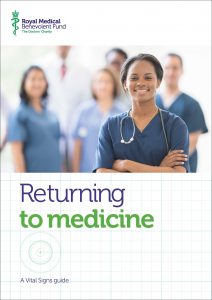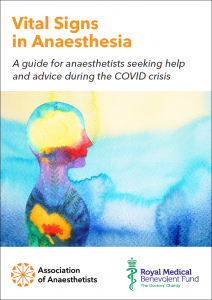Our guides for doctors and medical students seeking help and advice
 Returning to medicine: a Vital Signs guide
Returning to medicine: a Vital Signs guide
Returning to medicine after some time away can be daunting. Many doctors who have had a break from practice experience anxiety, guilt, imposter syndrome and other issues. This guide, produced with support from BMA Giving, helps returning doctors to explore those difficult feelings and realise that a break can be enriching. It also lays out many sources of practical support for your return to practice and training.
Download (.pdf)

Vital Signs in Anaesthesia
In 2019, the RMBF launched a new partnership with the Association of Anaesthetists, aiming to improve wellbeing support for doctors in the speciality. A new edition of the Vital Signs guide is part of that partnership – an especially timely document giving help and advice during the Covid-19 crisis.
Download (.pdf)

The Vital Signs for Medical Students
In 2017, the RMBF relaunched its programme of support for medical students. Written with the help of medical students and recently qualified doctors, the new Vital Signs guide outlines the unique stresses and pressures of medical school, offers advice and strategies for coping with the rigours of a medical education, and signposts people and organisations who can help in tough times.
Download (.pdf)

The Vital Signs
This guide is for all doctors, and was released as part of our What’s Up Doc? campaign to spotlight the pressure they face at work. It sets out the key stress and pressure points for doctors, provides practical advice, and signposts support and resources for those experiencing stress and difficulty. It also provides background on how the culture of the medical profession contributes to stress and isolation for doctors.
Download (.pdf)

The Vital Signs in Primary Care
This updated version of The Vital Signs for primary care doctors sets out the key stress and pressure points to watch out for as a GP and GP trainee. This guide has been made possible with support from NHS England.
Download the guide (.pdf)
 About the author: Dr Richard Stevens
About the author: Dr Richard Stevens
Dr Stevens studied Psychology and Physiology at Oxford before his medical degree. He has a certificate in psychodynamic counselling. He was a GP principal in Oxford for thirty years and was a trainer and tutor. He is a Coach and former Associate Director of Thames Valley Professional Support Unit.
